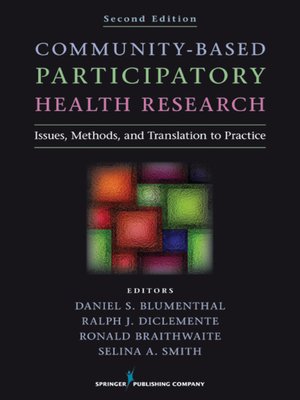Community-Based Participatory Health Research
ebook ∣ Issues, Methods, and Translation to Practice
By Daniel S. Blumenthal

Sign up to save your library
With an OverDrive account, you can save your favorite libraries for at-a-glance information about availability. Find out more about OverDrive accounts.
Find this title in Libby, the library reading app by OverDrive.



Search for a digital library with this title
Title found at these libraries:
| Library Name | Distance |
|---|---|
| Loading... |
ìCommunity-Based Participatory Research (CBPR) has become the preferred model for conducting research in communities. Most scientists who conduct such research now recognize that working in partnership with the community is preferable, and more ethical, than conducting research on a communityÖ. As Surgeon General of the United States, I direct a number of programs aimed at encouraging Americans to avoid tobacco, engage in physical activity, consume more nutritious diets, and protect their health in other ways. We need more effective methods to persuade, motivate, and enable individuals and communities to adopt these healthier lifestyles, and it is through CBPR that we will be able to discover these methods.î
From the Foreword by Regina M. Benjamin, MD, MBA, U.S. Surgeon General
ìThe editors of this book bring together in one place both a description of epidemiological methods and a discussion of community-level issues. It is a volume that will prove useful to those who wish to conduct contemporary community-based research.î
ñ Praise for the First Edition from the Foreword
David Satcher, Former Surgeon General of the United States
This second edition of a highly regarded textbook on the foundations of and strategies for achieving fertile community-based health care research has been completely revised and updated. It now includes new chapters on translating research into practice, evaluating research, and applying community-based participatory research (CBPR) principles to service, education, and evaluation. The book also updates a crucial chapter on the voices of community stakeholders and an important study of the ethical issues surrounding the Tuskegee Syphilis Study. Edited by renowned professors of community-based research, the text is distinguished by its how-to approach and focus on practical research methods.
The text discusses the unique challenges of conducting CBPR and addresses ways to build and sustain community partnerships. It explores ethical issues regarding health care research, includes input from community stakeholders, and describes national and international support for CBPR. Research methods covered include qualitative studies, surveys, and intervention trials. Applications of CBPR illustrate how to translate research into practice and community-based participatory approaches to service, education, and evaluation.
The second edition includes new chapters on:







